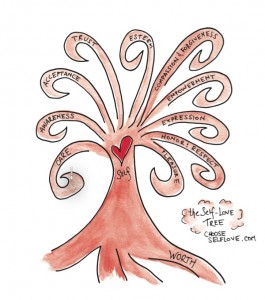When it comes to self-esteem and friendship, there is no end to the correlations that are so frequently made. People with more friends have higher self-esteem, and people with high self-esteem seem to have an easier time making friends-- the two results almost creating this self-sustaining cycle that can keep feeding itself. If you're already in the cycle, that is. But what if you're not in that supportive cycle? You may have a hard time making friends and struggle with a low self-esteem. Then it's a catch-22 because while making friends will increase your self-esteem, it's harder to make them without having it first. So do you try to make friends to feel better about yourself or try to increase your self-esteem before making friends? A classic chicken-or-egg first kind of question.
My answer? Both.
Increasing My Self-Esteem
Self-esteem comes from having a strong belief in who we are and what we can do. So certainly believing in oneself to make friends and then accomplishing that goal comes from, and results in, one feeling an increase in self-esteem. But several steps before self-esteem comes such things as self- awareness, self-trust, and self-care.
If we didn't do the deeper work then our self-esteem rises and falls with every life change. Exhausting and not sustainable. We don't want to feel good about who we are when we make a friend, and then feel bad about who we are when we lose a friend. Same with any life circumstance-- we don't want how we feel about ourselves to look like a roller coaster that is based on what job we have, our current weight, or our relationship status.
Nothing circumstantial has the power to do the deep and sustaining work of fostering what you're actually creating: love. Self-love.
My friend Christine Arylo, author of Madly in Love with ME: The Daring Adventure of Becoming Your Own Best Friend
"Each of these aspects of self-love relates to and supports the others, just as the branches of a tree rely on each other to grow, be healthy, and keep the tree balanced and strong. When you practice self-care, you increase your self-compassion. When you build your self-awareness, you increase your self-esteem. When you improve your self-esteem, you more fully feel your self-worth. When you practice self-trust, you base decisions on self-respect. When you take actions that reflect a deep self-respect, you honor yourself. When you express yourself fully, you increase your self-pleasure. And when you exude self-compassion, you create self-acceptance. Each branch supports the other branches, and as one grows, so do the others."
Her first suggested step for building your self-esteem? Increase your self-awareness. Get to know yourself. It's hard to love who you don't know. :) Past all the titles, images, and pretenses. Deeper than what others say about you or who you wish you are-- explore and get to know you. (You can see why self-compassion and self-forgiveness need to be intertwined in the process!)
Increasing My Friendships
While we need to be our own best friend before we can truly be in healthy friendships and feel confident in our friend-making process, it doesn't mean we sit in a cave until then. We can't lock ourselves in isolation, because no one grows more loving in a loveless vacuum. Our self-esteem, belief in ourselves and our abilities, doesn't grow without practice. So while we're having honest conversations with ourselves, understanding who we are and aren't, and seeking to embrace how we're wired-- we're also observing how our thoughts, actions, and decisions are affecting our relationships.
One study came out this year that gives us a little guidance about how to engage in meaningful and healthy ways even when our self-esteem isn't quite yet where we want it to be. The study tracked high self-esteem and low self-esteem individuals engaging in Facebook to see if perhaps that forum was a safer place for low self-esteem individuals to interact without fear of awkward social situations.
The study results showed that:
- Low self-esteem individuals were more likely to post negative status updates than high self-esteem individuals. (And get less of a response to them compared to when a high self-esteem individual posted an occasional negative update.)
- And, that others who read the status updates of low self-esteem individuals ended up liking them less as they were perceived as sad, negative, angry, or pessimistic.
So while the low self-esteem updaters may, in fact, feel safer on Facebook; their honest revelations are backfiring if their goal is to be more likable and build friendships. Other studies have shown that Facebook causes more stress for those with low self-esteem as they also see what everyone else is doing and can frequently feel worse about their own life.
From this, a word of encouragement to those who feel that their self-esteem journey is closer to the starting line than the finish line: practice engaging, but stay positive.
In other words, you may not yet have the self-esteem to be making friends, but you can start with being friendly. Being friendly is a choice-- it's a choice to be affirming of others, warm, and hopeful. As you give that gift to others, you'll find you also give it more to yourself. And your cycle of self-esteem and relationships can start-- your friendliness and your growing self-love-- will both get healthier together.
The end result hopefully being a woman who genuinely loves herself and others well, products of a strong self-esteem.
-----------------





